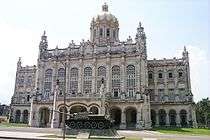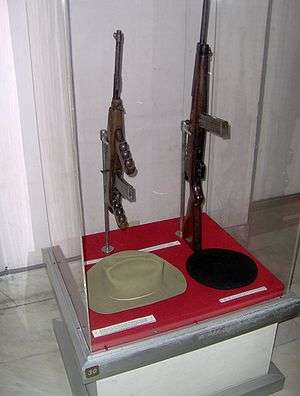Museum of the Revolution (Cuba)

The Museum of the Revolution (Spanish: Museo de la Revolución) is a museum located in the Old Havana section of Havana, Cuba. The museum is housed in what was the Presidential Palace of all Cuban presidents from Mario García Menocal to Fulgencio Batista. It became the Museum of the Revolution during the years following the Cuban revolution.
Building
The former Presidential Palace was designed by the Cuban architect Carlos Maruri and the Belgian architect Paul Belau and was inaugurated in 1920 by President Mario García Menocal. It remained the Presidential Palace until 1959. The building has Neo-Classical elements and was decorated by Tiffany & Co. of New York City.
Exhibits
The museum's Cuban history exhibits are largely devoted to the period of the revolutionary war of the 1950s and to the country's post-1959 history. Portions of the museum are also devoted to pre-revolutionary Cuba, including its War of Independence waged against Spain.
Behind the building lies the Granma Memorial, a large glass enclosure which houses the Granma, the yacht which took Fidel Castro and his revolutionaries from Mexico to Cuba for the revolution. Around the Granma an SA-2 Guideline surface-to-air missile of the type that shot down a U.S. Lockheed U-2 spyplane during the Cuban Missile Crisis, and the engine of the U-2 airplane is displayed. There are also various vehicles and tanks used in the revolution displayed. Near the museum is located an SU-100, a Soviet tank destroyer.
Gallery
 The Presidential Palace c. 1921-1939
The Presidential Palace c. 1921-1939 Che Guevara and Camilo Cienfuegos statues on display in the museum
Che Guevara and Camilo Cienfuegos statues on display in the museum Che Guevara and Camilo Cienfuegos guns and caps
Che Guevara and Camilo Cienfuegos guns and caps The palace ballroom
The palace ballroom
 Arnaldo Tamayo Méndez's space suit
Arnaldo Tamayo Méndez's space suit Hawker Sea Fury F50 at the museum
Hawker Sea Fury F50 at the museum SU-100 at the museum
SU-100 at the museum Armoured vehicle with flamethrower
Armoured vehicle with flamethrower Radio transmitter of Che Guevara
Radio transmitter of Che Guevara Jeep Willys seized from Batista's army troops.
Jeep Willys seized from Batista's army troops. "Rincon de los cretinos" - caricatures of antirevolutionists
"Rincon de los cretinos" - caricatures of antirevolutionists
External links
| Wikimedia Commons has media related to Museum of the Revolution. |
- The Museo de la Revolución's home page (In Spanish)
- English travel guide to the Museum of the Revolution
Coordinates: 23°08′30″N 82°21′24″W / 23.14167°N 82.35667°W